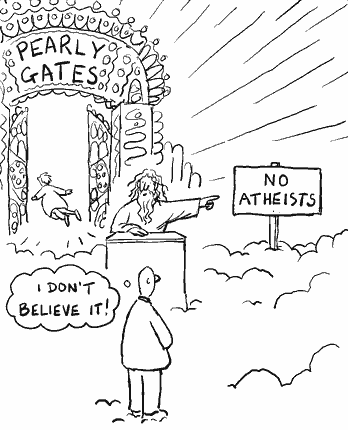Checking for Atheists
 One of the things I like to do when I see the markets bounce is what I call my “atheist check.” Essentially, I take a look at the current and recent numbers for the ISEE to see if there are many believers who are flocking to buy call options. The lower the number, the more atheists there are that are still out there (or ‘undecideds’ if you prefer the political metaphor to the religious one), and therefore the larger number of potential converts available. Contrarians love potential converts, as they are the future fuel for subsequent bull legs. Generally, when I see an ISEE number (they use a call to put ratio, not a put to call ratio like the CBOE does) of 120 or below, I consider this to be a bullish signal. An ISEE of under 100, which signifies more people opening new put positions than call positions, is very bullish.
One of the things I like to do when I see the markets bounce is what I call my “atheist check.” Essentially, I take a look at the current and recent numbers for the ISEE to see if there are many believers who are flocking to buy call options. The lower the number, the more atheists there are that are still out there (or ‘undecideds’ if you prefer the political metaphor to the religious one), and therefore the larger number of potential converts available. Contrarians love potential converts, as they are the future fuel for subsequent bull legs. Generally, when I see an ISEE number (they use a call to put ratio, not a put to call ratio like the CBOE does) of 120 or below, I consider this to be a bullish signal. An ISEE of under 100, which signifies more people opening new put positions than call positions, is very bullish.
As a rule, an ISEE of under 100 is relatively rare, particularly over extended periods. What I find noteworthy about the current market is that the ISEE has closed below 100 for five of the past six days and at 92 as of 12:50 EST today, is on target to make that six of seven. The only other time that the ISEE has registered six of seven sub-100 closes since the exchange began keeping records in October 2002 is in August 2007, at the very bottom of the selloff caused by the first iteration of a subprime panic.
As far as I am concerned, the current ISEE data is almost as compelling as the 37.50 VIX spike we had in August. While the VIX demonstrates how fearful the atheists are, the ISEE reveals how many of them are out there and reminds me of one of my favorite quotes, which comes from John Bender and appears in Jack Schwager’s Stock Market Wizards, “It's not the current opinion of the stock that matters, but rather the potential change in the opinion.”


9 comments:
Good points Bill (as always) but we never saw a panic spike down to 60 or so. While we are making progress (witness the once huge now absent LIBOR 3TB spread and the fact that the Japanese Yen can rally without causing carry trade pain). My thesis is that we're seeing less nervousness in the ISEE and VIX now because traders see a trend and they are short already. You don't need to nervously buy puts or buy VIX when you're already hedged or net short. We saw this situation develop in 2001 and 2002 as well; there was less panic, because traders knew we were going. We need to consider opposite logic now, use VIX dips and ISEE call/put rallies to short
Loved the cartoon. Hopefully, it only applies to avowed atheists. If it also applies to non-atheist believers in "faith or something like God, or maybe some kind of dharma thing ... ya know?", then about 80% of the residents of Marin county are going to be disappointed.
So will I.
TimmyBear, signing off.
Excellent counterpoint from a guy who clearly knows his stuff.
I'm beginning to believe that just like "yet another roadside attack in Iraq..." many investors have become somewhat desensitized to the continuing credit drama.
Truth be told, I'm not entirely sold on the bear market thesis, but if last week's bottom fails to hold, I'm switching to an aggressive short bias. Frankly, whichever way things fall, both of us will still have a chance be on the side of the next big move, assuming we are more nimble than stubborn -- and sometimes that is more important than being out in front of a move.
I always appreciate your input, Tim.
Cheers,
-Bill
I apologize if I missed it, but did you post a missive about how you go about choosing stocks for your A1 portfolio? I realize you've probably got some secret sauce you want to keep in the vault, but any generics you can offer would be appreciated. Thank you.
-Jon
Hi Jon,
The stock selection process for Portfolio A1 boils down to this:
1) I use a ranking system that I developed on Portfolio123.com. The good news is that it is derived from their Balanced4 ranking system, which they make available to the public
2) Each weekend, the full universe of stocks is ranked according to various fundamental and technical criteria. If one or more of my holdings triggers a sell rule, it is dropped and thus clears space for a new addition
3) The buy rules include some liquidity minimum criteria(volume, market cap, price, etc.) and sector concentration rules (which I detailed yesterday.) In determining which stock will be added to the portfolio, the system starts from the top of the stock ranking list and keeps going until it finds a stock that satisfies the minimum liquidity rules without violating the sector concentration limits. Essentially, that's the whole process.
I dedicated a full post to explaining what Portfolio123.com was all about in Portfolio123.com: The Engine Behind Portfolio A1
If you want to look at some of the factors that are essential to my stock ranking system, you can infer many of these by studying the Balanced4 ranking system at Portfolio123.com
Good luck!
Cheers,
-Bill
Do you see any usefulness in VIX/ISEE ratios as being a market timer? I notice you have some commentary on VIX/SDS but since you feel that VIX is not truly reflecting current "fear" does the VIX/ISEE ratio offer any more insight?
Just a thought.
Thanks for the excellent posts!
Good question, Adam.
In a nutshell, low volatility relative to put to call activity -- like we have now -- is bearish. I will expand upon this in a post in a few minutes.
Love that cartoon. Can't wait to forward this on to my Atheist friends. Check out Penn from Penn and Teller (devout atheist) and his remarks about the Pope. Must admit it is pretty funny as well. Perhaps this can be applied to this roller coaster market.
http://sofiastreamofconscious.blogspot.com/2008/01/penn-says-i-agree-with-pope.html
go to these guys try this website have a peek at these guys pop over to this web-site have a peek here Dolabuy Dior
흠 !! 이 블로그는 정말 멋져 1인샵
Post a Comment